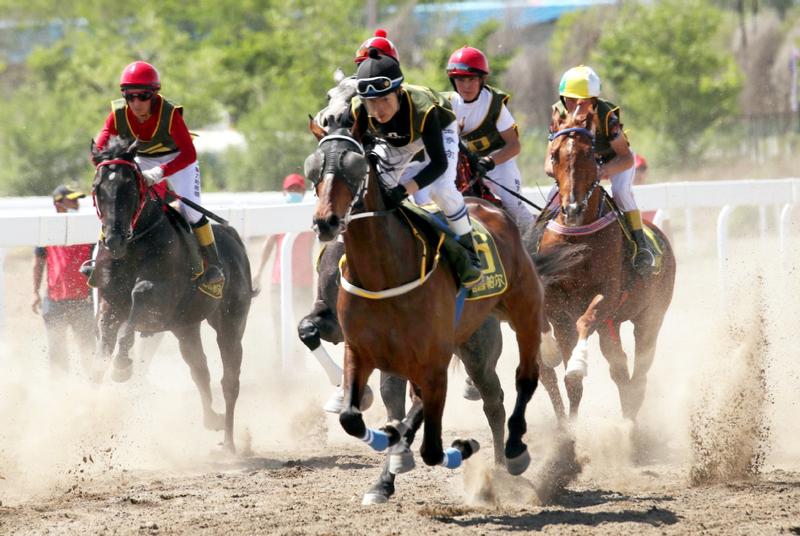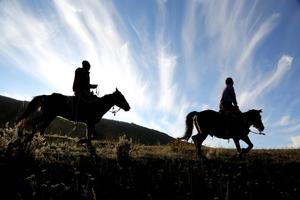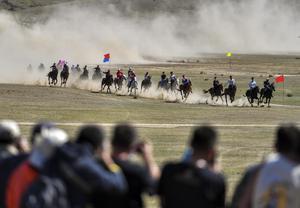Regional government hopes advances will help it earn high profits this year
 Horses race around a track in Changji, Xinjiang Uygur autonomous region, in May. (ZHANG XIUKE / FOR CHINA DAILY)
Horses race around a track in Changji, Xinjiang Uygur autonomous region, in May. (ZHANG XIUKE / FOR CHINA DAILY)
The Xinjiang Uygur autonomous region has been exploring multiple ways to expand its equine industry, from breeding horses for police forces to mounted tours and medical products.
The region has 57 million hectares of grassland and is home to 730,000 horses, which is more than 20 percent of China's equine population, according to the National Bureau of Statistics. With six different breeds, Xinjiang has the country's richest horse resources.
In April, the regional government introduced a plan to promote the horse industry this year and accelerate the development of related sectors in Xinjiang.
According to the plan, the output of the horse industry in the region is expected to be valued at 9.5 billion yuan (US$1.34 billion) this year. The plan aims to further develop the horse-breeding system, build more breeding facilities, promote equine-related tourism and organize horse racing events.
 Tourists ride horses around Kanas Scenic Area in Altay, Xinjiang. (WANG CHUN / FOR CHINA DAILY)
Tourists ride horses around Kanas Scenic Area in Altay, Xinjiang. (WANG CHUN / FOR CHINA DAILY)
Modernization
The results of the regional government's 2016 modernization plan for the industry, which focused on improving the quality and value of Xinjiang horses as well as job creation, are already being seen.
"To train more professionals, the regional government cooperated with Xinjiang Agricultural University and established hippology studies in the university's College of Animal Science," said Yao Xinkui, head of the university's Horse Industry Research Institute.
"Two hundred students who studied hippology have graduated, and we believe more students will study hippology."
Zhaosu county in Ili Kazak autonomous prefecture has 120,000 horses, which makes it the county with the highest number of horses per capita in the country.
After 2016, Zhaosu invested more than 30 million yuan on improving the infrastructure of its stud farms and over 20 million yuan on breeding local horses with better quality ones.
Chen Weigang, a supervisor at one stud farm, said Zhaosu Ili horses had been sold to equestrian clubs across the country. "The performance of the horses has been recognized by many people," Chen said.
In September, 12 horses from Xinjiang were sent to Dalian, Liaoning province, for the city's mounted unit of policewomen. The horses, which were bred by an animal husbandry company, have an even temperament and went through a rigorous screening process before they were accepted by the unit.
 Kazak herders join in a horse race during a folk festival in Fuhai county, Xinjiang, on May 31. (LIU XIN / CHINA NEWS SERVICE)
Kazak herders join in a horse race during a folk festival in Fuhai county, Xinjiang, on May 31. (LIU XIN / CHINA NEWS SERVICE)
Hormone therapy
For ethnic Kazak herdsmen living on the steppes of Ili, collecting pregnant mare urine from their herds has become a new income source.
Xu Zhiyong, general manager of Xinjiang Nuziline Bio-pharmaceutical, which focuses on PMU drugs, said the urine is processed for estrogen that can be used in hormone replacement therapy for women experiencing menopause.
"One kilogram of PMU can sell for 4.3 yuan to 7.8 yuan," said Erbolsun Abdukhan, a Kazak herdsman living in Ili's Xinyuan county.
"I earned over 20,000 yuan from December to March, the prime season for collecting PMU."
In the past, animal welfare activists in North America criticized the way pregnant mare's urine was collected as the horses were kept in confined spaces for lengthy periods. However, Xu said his company had addressed the issue.
"Our company collects PMU from about 400 local households, half of them poor families, and we have strict management rules and a fixed daily collection quota to ensure that the PMU is collected in a humane way," he said.
Xinjiang produces more than 5,000 metric tons of PMU a year, which is about a quarter of the world's total production.
"The PMU production line in Xinjiang is the first in China, and it helped the country to break the overseas monopoly of PMU," Yao, from the Horse Industry Research Institute, said.
Tourism boost
Riding a horse in the mountains is always a tempting experience for visitors to Xinjiang, and more local herdsmen are willing to rent their own horses and benefit from the booming growth in tourism.
"Two hours on horseback means a net income of some 160 yuan," said Serik Khulabek, a member of a horse-riding tourism service team in Ili. "During peak season, I can take three tourists for a horse ride every day. The horse is more like a cash cow now."
Yao said this was yet another way for herdsmen to generate income, and the Xinjiang horse industry has great potential. "I believe with a modern, integrated and sustainable horse industry in the future, society and individuals in Xinjiang will benefit a lot," he said.
Mao Weihua in Urumqi contributed to the story.


